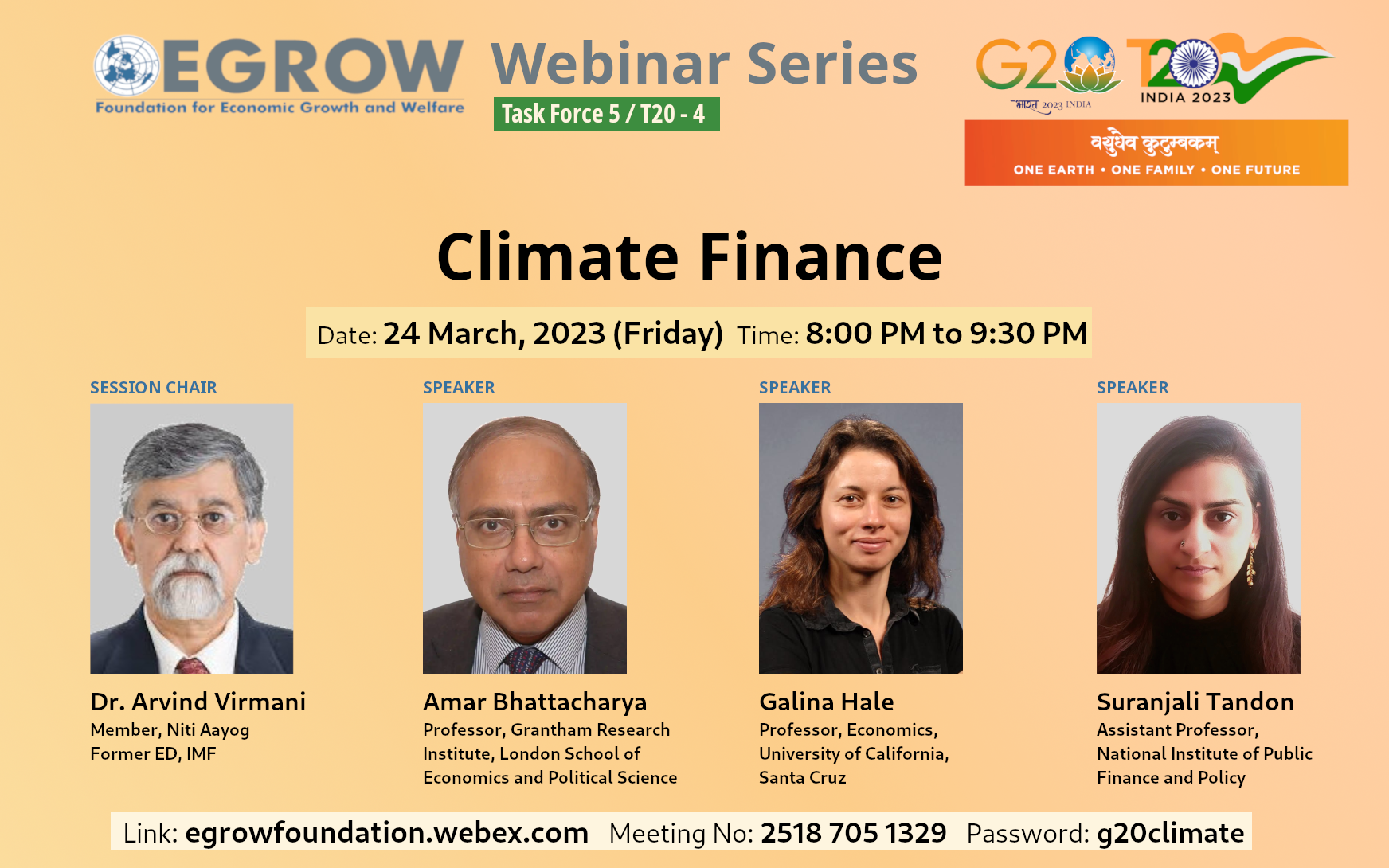Climate Finance

Webinar Link
Meeting No: 2518 705 1329
Password: g20climate
Certificate of Participants
To recieve certificates, please register and attend
Abstract
Climate finance aims at reducing emissions and enhancing sinks of greenhouse gases and aims at mitigating vulnerability of, and maintaining and increasing the resilience of, human and ecological systems to negative climate change impacts. This definition of climate finance represents the flow of funds to all activities, programmes or projects intended to help address climate change: for both mitigation and adaptation, in all economic sectors, anywhere in the world. Importantly, tthis definition only includes finance flowing directly to assets and activities and leaves out the financial market activity, such as bank loans to companies or investments in private and public equity. This is to adhere to the core principle of avoiding ‘double counting’. The term ‘climate finance’ is also frequently associated with international diplomacy on climate change. In this context, climate finance implies “new and additional financial resources” provided by developed countries to developing countries so that they can meet the full and incremental costs of climate change and de-carbonisation.
About the Speakers
Dr. Arvind Virmani
Arvind Virmani is member of NIti Aayog. He was Chairman of the Foundation for Economic Growth and Welfare (EGROW) and President of the Forum For Strategic Initiatives (FSI, Delhi). He has been a Mentor (economic policy) to FICCI & a member of RBI Technical Advisory Committee on Monetary policy He was earlier Executive Director, IMF and Chief Economic Advisor, Ministry of Finance and Principal Advisor, Planning Commission. During his tenure he advised on a host of economic policy reforms, through 100s of policy papers, notes and committees. He has served as Member, Telecom Regulatory Authority of India (TRAI) and as Director & Chief executive of the Indian Council for Research on International Economic Relations (ICRIER). He has published 35 journal articles and 20 book chapters and written over 50 other working papers in the areas of Macroeconomics, growth and finance, tax reform, International trade & Tariffs, International relations, and national security strategy.
Amar Bhattacharya
Amar Bhattacharya is a Visiting Professor in Practice at the Grantham Research Institute at LSE. Amar will be working closely with Lord Stern and his team on international finance, climate action and sustainable growth, as well as economic and climate policies in India.
Amar Bhattacharya is a senior fellow in the Center for Sustainable Development, housed in the Global Economy and Development program at Brookings Institution. From April 2007 until September 2014 he was Director of the Group of 24, an intergovernmental group of developing country Finance Ministers and Central Bank Governors. Prior to taking up his position with the G24, Amar had a long-standing career in the World Bank. His last position was as Senior Advisor and Head of the International Policy and Partnership Group. In this capacity, he was the focal point for the Bank’s engagement with key international groupings and institutions such as the G7/G8, G20, IMF, OECD and the Commonwealth Secretariat.
Amar completed his undergraduate studies at the University of Delhi and Brandeis University and his graduate education at Princeton University.
Galina Hale
Galina Hale (Borisova) is a Professor of Economics at UC Santa Cruz. Previously she served as a Research Advisor at the Federal Reserve Bank of San Francisco, and an assistant professor in the economics department of Yale University. She also taught a number of courses as a visiting faculty at Stanford and UC Berkeley.
Galina began to study economics in Russia, first in Moscow State University economics department and then at the New Economic School's master's program. When in Russia, she briefly worked as a consultant for the Russian Ministry of Finance and as a chief editor for a weekly newsletter of the Russian Central Bank's news agency. She received her PhD in economics from UC Berkeley, under the supervision of Barry Eichengreen.
Galina's research interests lie in three main areas: understanding patterns of international capital flows, stability of financial system, and the nexus between ESG sustainability goals and financial system. Galina has published her work in such journals as the Economic Journal, Journal of Econometrics, Journal of European Economic Association, Journal of International Economics, Journal of Financial Economics, Journal of Banking and Finance, IMF Economic Review, Review of Financial Studies, among others. She co-wrote with Cheryl Long a monograph “Foreign Direct Investment in China: Winners and Losers.” In addition, Galina has been recently working on ways economists can inform policymakers on how to make food system more sustainable.
Galina currently serves as a co-editor of the Russian Journal of Central Banking, associate editor of the Journal of International Economics, and a member of editorial board of the IMF Economic Review and Pacific Economic Review. She has co-edited special issues of the Journal of International Economics and of the IMF Economic Review. Galina is a director of the CEBRA's IFM program and a co-director of the UCSC Center for Analytical Finance (CAFIN). She servers on multiple board and committees in animal welfare and animal agriculture space.
In her free time, Galina trains for and participates in long distance running and triathlon races and travels to beautiful places
Suranjali Tandon
Suranjali Tandon is Assistant Professor at NIPFP where she leads the work on direct taxation and sustainable finance. She is currently a member of the T20 task force on “Refuelling Growth: Clean Energy and Green Transition”. She has been a special invitee to the task force on sustainable finance, India set under the aegis on Ministry of FInance and is an expert invitee to International Financial Services Centre Authority’s sub-committee on sustainable finance related to disclosures. She is an expert advisor to India Lab by Climate Policy Initiative and Ola Mobility Institute. She has worked in the past on many projects with the Department of Revenue and Department of Economic Affairs on key policy issues.
Suranjali is Chevening Financial Services Fellow 2019 at King’s College London and has PhD in Economics from Jawaharlal Nehru University, India.